- Home
- Francis Spufford
Golden Hill Page 3
Golden Hill Read online
Page 3
Round to the left, the swaying mast-forest beckoned from behind the houses, and now Smith took the invitation of a street’s mouth, and followed into the gullet of the town. Prosperous dwellings, here, with window-glass glinting, and maids swilling doorsteps and stairways clean; counting-houses too, and stalls, and shops; streets a-bustle, heterogeneously, for though the houses were plain as day the domicile of wealth, New-York’s answer to the new-pattern’d squares of the West End, the business of the port was running through them, in mixtures London did not see. Wagoners moving boxes, cases, crates, barrels; fresh-landed emigrant families carrying off their all, looking as dazed (no doubt) as he did himself; a coffle of shuffling black men in irons underscoring the street music with a dismal clank. In London the costers would not have cried their apples at the Lord Mayor’s door, a goldsmith would not have been in business next to a meagre dealership in marine supplies. There were omissions too, as well as unexpected presences. Smith had instructed his brain to ignore the information of his nose – schooled reflex of the city-dweller, in the face of stinks – and it took a little time for his brain to take the news that there were few stinks to ignore. The vapour from the scalps remained the worst of New-York’s bouquet. A little fish, a little excrement; guts here, shit there; but no deep patination of filth, no cloacal rainbow for the nose in shades of brown, no staining of the air in sewer dyes. A Scene of City-Life, his eyes reported. A Country-Walk, in a Seaside District, his nostrils counter-argued. No smells; also, he realised, no beggars. He had been strolling the city’s densest quarter for minutes, and yet no street-Arab children pepper-pointed with sores had circled him round, no gummy crones exhaling gin had plucked his sleeve, no mutilated men in the rags of uniform had groaned at him from the ground. He wandered at his ease among strangers who seemed universally blessed with health and strength and moderate good luck, at least, in life’s lottery. Not to mention height. He was used, in the piazza of Covent Garden, to standing taller by a head than the general crowd; but here, in the busy bobbing mass of heads, he was no taller than the average.
It was perhaps because of this relaxation of the usual irritations of the street that Smith, without taking notice of it, relaxed in turn the town-dweller’s habitual guard, and failed to perceive, as he reflected and considered, that others were meanwhile reflecting and considering upon him. He paused to admire the unloading boats, where an arm of the harbour pushed up among the houses. He passed into a narrow square where printer’s devils ran from door to door with bundles of paper, and smiled on enquiring its name and being told it was Hanover Square, for its London counterpart ran less to ink, and more to ballrooms lit by half a thousand candles. He spied a coffee-house ahead, from which came perfumes of hot bread and well-ground beans, and stopping short of it, did what he would not have done at home, or anywhere he had full conviction he trod the humdrum earth. To try to sift from the unruly cram of Mr Lovell’s paper a suitable scrap to command his breakfast, he pulled out in the street his whole pocket-book. Quick as a wink, one of his followers dashed forward, snatched it, and took to his heels up the road ahead.
Smith had had his riches in his hand. Suddenly he did not. Smith gawped. Smith stared stupidly at the empty hand where money had been. And a document besides, which— But there was no time for that. Smith hesitated – considered shouting ‘Stop thief!’ – perceived a train of likely consequences – shook his head like a man assailed by flies – and set off in pursuit himself, silently, instead. His moment’s stillness had given the snatcher a lead of twenty yards or so already, and though Smith’s legs pumped and his green coat’s tails flew out behind him, the goal of his chase was slipping deftly between backs, round corners, up alleyways. Now the streets of New-York reeled by, not at a stroll but at a sprint; the same scenes, the same mixture of familiar and unfamiliar chequered close together as black and white squares of a chess board, but accelerated, passing at a blur; in fact, some of the very same route he had trodden the night before, but now had no time to recognise, as he gasped, and pounded, and felt the enforced enfeeblement of his shipboard weeks dragging at his limbs, while the figure ahead, jinking and turning, weaving and bounding, drew no closer, in fact pulled ahead. The thief was thin, with long, straight, black hair, and seemingly tireless legs in grey breeches, and bare dirty feet that twinkled as they rose and fell: that was all Smith could tell as the distance widened.
Now they were running uphill. Smith, seeing the grass of an open space ahead, and deducing that every street here must run upward in parallel to the open ground, whatever it was, resolved on a desperate expedient, and flung himself right at the next cross street, then left uphill again on the next street over, meaning if he could to cut the fugitive off at the top. The street was far emptier here, and Smith made himself squeeze out the greatest pace he could as he bolted upward (as he hoped) in parallel to his wallet. There were no more cross streets: no chances to see if his stratagem was working. Bare walls, poorer doors, empty lots. A hammering heart. Lungs on fire. The top of the street coming up. Smith threw himself left once more and gasped his way across to the top end of the original street, expecting at any moment to catch sight again of his quarry. He turned the corner.
Nothing; nobody. Nobody in sight at all at this end. The currents and eddies of the town’s traffic all flowed other ways, leaving this street, at this moment, as an empty backwater. Just a hundred closed door-ways in the bright morning light, into any of which, Smith saw, realising the magnitude of his error, the thief might have vanished. He could not knock on all of them. He wheeled around. The green space was a ragged common. A cow was gazing at him, chewing the cud in comfortable incuriosity. Any of the bushes might conceal a thief. Then again, they might not.
Mr Smith put his hands on his knees and breathed; labouring, just as much, to bring his emotions under his control, to stop the indignant working of his mouth, which wanted to form – which wanted to shout – words he would not permit it. When his chest no longer heaved, he smiled, experimentally, at the cow, and if the expression resembled a rictus somewhat, a drawing of the lips from the teeth such as a corpse may perform when the strings of the flesh tighten in death, it was, nevertheless, voluntary, which was the only quality he just then required of it. The cow was indifferent.
Then Mr Smith walked onto the common, past a cricket-pitch worn to bare dirt at the wickets, past a pot kiln and a charcoal-burner’s fire and a flock of sheep, and found himself a spot between trees where he could feel as sure as may be that he was not observed; and there, in the security he had not bothered to assure himself of earlier, he turned out the coat pocket where he had kept the pocket-book, and investigated his resources. As he had hoped, some of the paper bills had escaped in his carelessness, and were loose in there. But not many. He smoothed them out one by one, and counted. Five – six – six shillings and six – and eightpence – and this dirty spill was a sixpence too – and another shilling. Eight shillings and eightpence, in the money of – he squinted – New-York and New Jersey. The flimsiness of the paper seemed altogether less entertaining now. Plus, he remembered with a burst of relief, the small pile of veritable coin, which he had left in a heap at his bedside. Twenty-nine shillings odd, where he had reckoned on six times as much. He calculated. Could he live as he had planned? No. He would live as he must.
When he rose from his hiding place, his smile convincing once more, the road running along the far side of the common struck him as somehow familiar-looking, and a minute’s walk in that direction confirmed it. It was the Broad Way continuing in the other direction to the one he had set out in. He had circled the whole town; that was New-York, all of it. The far end of the common was blocked with a palisade, and the Broad Way, cobbles diminished into a cart-track, went out through the barrier at another sentry post. At a venture, he asked if the soldier decorating the ground there with spit had seen anyone; anyone running.
‘Migh’er done,’ he said.
Smith studied the expectant face, and consider
ed the state of his pockets.
‘You didn’t, though, did you,’ he said.
‘No,’ agreed the soldier, amiably, and stuck his clay pipe back between his teeth.
III
With what sadder steps, and slower, Smith retraced his way, the reader may imagine; how the faces of passers-by, which had formerly expressed a cheerful involvement in their own concerns, now seemed locked tight, so many declarations of secretiveness and guile, not to be trusted; how the city itself, a few minutes before remarkable and new, now appeared provincial and small, rustic and contemptible, absurd in comparison to any metropolis of Europe, et cetera, with a mere delusive shine laid upon it by the morning. Even the savour of fresh bread, once he had returned to the coffee-house, stirred his appetite with less relish. He hesitated at the threshold. He had been out of sight of the window when he was robbed, he calculated. Yet he had run past, and might have been seen. Some customer might have been going in, or coming out, at the critical instant. His catastrophe might have been deduced. Well, well: nothing for it but to spin the wheel, and play.
‘Service!’ he cried, entering a long low room canopied in smoke, diversified with steam, where men (all men) conversed in a gruff murmur that rose and fell like a masculine sea. At an unoccupied table he bounced into a chair and settled with a wide spread of knees, a confident sprawl of legs, a benignant beaming in all directions.
‘Service!’
Heads turned, but mildly, slowly; not – he judged – with that quickness that betokens an interest in a drama resumed at its exciting mid-point. Not as if they were expecting Act Two of The Wrong’d Traveller, in which Simon Simple (an ingénu from the country) loses his all to a sharper, and must throw himself upon the dubious mercy of Sir Bartholomew Quorum (a lawyer) and Mrs Spurt (a bawd). It seemed only the slow stir with which any coffee-house registers an unknown come among regulars; fresh supply of another talking head, loud or wise or foolish as the case may be, to be recruited into the great plural organism of the room, which now and again loses a body or gains a body, as people arrive and depart, but talks on, talks on.
‘Yessir?’ A boy had bustled up in a white apron. ‘Tea, coffee or chocolate, sir?’
‘A pot of the dark Mahometan, no cow juice.’
‘Yessir. Victuals?’
‘Basket o’ white tommy.’
‘Yessir. News-paper, sir?’
‘What do you have?’
‘Post-Boy, Intelligencer or Monitor, sir.’
‘All three, then.’
‘Yessir. In a moment, sir. May have to wait for the Post-Boy, sir. Only one copy in this morning, and it’s with those gentlemen over there.’ – A youngish pair, one bearded and one in horn-rimmed spectacles, laughing over by the window.
‘Just the others, then,’ said Smith. ‘No need to bother ’em.’
The rolls came, smelling of the oven, and the coffee in a pewter pot that London would have called ten years behind the fashion, its sides were so straight and its handle so lacking in decorative folderol. The boy whirled the breakfast in on one tray while he kept two more balanced up his arm; shifted, uncrooked his neck to release the folded pages he’d clamped against his shoulder with his chin; laid them before Smith; spun onward into the next figure of his coffee-house dance. Smith found his appetite returning. He inhaled the rising savours of basket and pot as if they were friends whose shoulders he could throw his arms around, and fell to his meal, munching and buttering, licking crumbs from his fingers while he propped the papers against the pot, and the clatter of plates and speech and the guggling liquid made their familiar music, played continuo.
When he had ate his fill, and proceeded from the urgent first cup and necessary second to the voluntary third which might be toyed with at leisure, without any particular outcry seeming to suggest he should be on his guard, he leant back, spread the city’s news before him, and, by glances between the items, took a longer survey of the room. Session of the Common Council. Vinegars, Malts, and Spirituous Liquors, Available on Best Terms. Had he been on familiar ground, he would have been able to tell at a glance what particular group of citizens in the great empire of coffee this house aspired to serve: whether it was the place for poetry or gluttony, philosophy or marine insurance, the Indies trade or the meat-porters’ burial club. Ships Landing. Ships Departed. Long Island Estate of Mr De Kyper, with Standing Timber, to be Sold at Auction. But the prints on the yellowed walls were a mixture. Some maps, some satires, some ballads, some bawdy, alongside the inevitable picture of the King: pop-eyed George reigning over a lukewarm graphical gruel, neither one thing nor t’other. Albany Letter, Relating to the Behaviour of the Mohawks. Sermon, Upon the Dedication of the Monument to the Late Revd. Vesey. Leases to be Let: Bouwerij, Out Ward, Environs of Rutgers’ Farm. And the company? River Cargos Landed. Escaped Negro Wench: Reward Offered. – All he could glean was an impression generally businesslike, perhaps intersown with law. Dramatic Rendition of the Classics, to be Performed by the Celebrated Mrs Tomlinson. Poem, ‘Hail Liberty, Sweet Succor of a Briton’s Breast’, Offered by ‘Urbanus’ on the Occasion of His Majesty’s Birthday. Over there there were maps on the table, and a contract a-signing; and a ring of men in merchants’ buff-and-grey quizzing one in advocate’s black-and-bands. But some of the clients had the wind-scoured countenance of mariners, and some were boys joshing one another. Proceedings of the Court of Judicature of the Province of New-York. Poor Law Assessment. Carriage Rates. Principal Goods at Mart, Prices Current. Here he pulled out a printed paper of his own from an inner pocket, and made comparison of certain figures, running his left and right forefingers down the columns together. Telescopes and Spy-Glasses Ground. Regimental Orders. Dinner of the Hungarian Club. Perhaps there were simply too few temples here to coffee, for them to specialise as he was used.
The pair by the window were coming over, still laughing, the one in the spectacles bearing the missing Post-Boy. He had a remarkably smooth, white, oval countenance, on which the dark circles of the horn frames made, somehow, a most neatly comic appearance. His hair was the stubble of one who usually wears a wig but is off duty.
‘Here you are,’ said the stranger, tilting a curious look at Smith. ‘No trouble, we’ve finished with it. You are welcome, sir, to all the slender pleasure it may give you.’ His voice was fastidiously educated and amused. ‘May I ask – did I just hear you say, “No cow juice”?’
‘It was in the nature of an experiment,’ said Smith. ‘I am new-come, and last night I drew a blank with a London word I thought was plain to all the world. So I made the venture of a little coffee cant today, just to see—’
‘Oh, you’ll have no luck with Quentin there, for he’s fluent in every English in which a cupful can be ordered, let alone Dutch, and most other tongues a sailor may bring through the door. French, Spanish, Danish, Portuguese. Latin, if all else fails. Nonne, Quentinianus?’ he said, as the boy passed by, deep in trays.
‘Sic, magister,’ said Quentin, gliding on.
‘Will you join me?’ Smith asked.
‘If you’re sure we don’t intrude—’ But they were already pulling chairs around, and waving two fingers at Quentin.
‘Septimus Oakeshott,’ said the smooth, pale one.
‘Hendrick Van Loon,’ said the other, pronouncing it with so little Dutch guttural, that Mr Smith took a moment to find the surname in it. Front of an army; name of a wading bird.
‘Richard—’ he began.
‘Oh, we know,’ said Septimus Oakeshott. ‘I’m afraid that everyone knows, Mr Smith. You are celebrated before you open your mouth. You are the very rich boy who won’t answer questions.’
‘Well …’
‘Unless, by chance,’ put in Van Loon, ‘you do answer them?’
‘Hendrick’s interest is professional,’ said Septimus, his comical eyebrows raised high on the blank egg of his forehead. ‘He actually writes for the Post-Boy.’
‘Not wholly professional,’ said Van Loon. ‘My family has
dealings with Gregory Lovell, so we are … intrigued … that you’ve come, Mr Smith. But it’s true that you’re news. And our friend Septimus here is plying his trade as well, in case you were wondering’ – paying Oakeshott smartly back – ‘for he is Secretary to the Governor, and we suspect him of keeping his ears wide open while he sits here in the Merchants.’
‘The Merchants?’
‘As opposed to the Exchange Coffee-House, back that way on Broad Street,’ said Septimus, pointing a white finger at the wall. ‘The coffee is better here, and the conversation.’
They both gazed hopefully at Smith. He, understanding that he was in the presence of the two powers of Press and Government, albeit their junior versions, gave his most guileless smile.
‘I’m afraid I am exactly as advertised,’ he said.
‘How unusual,’ said Septimus. ‘Exactly as advertised?’
‘Yes.’
‘What, in every detail?’
‘Yes.’
‘A perfect fit with legend?’
‘Mm-hm.’
Septimus waited, his face exhibiting the glazed patience of a porcelain owl, to see if there was more; but there was not, for Mr Smith was as patient as he. More coffee arrived, and the silence lengthened between the two ingenuous faces, with Van Loon glancing amused from one to the other, as if spectating at chess; and it was Septimus who spoke first, resuming the vein of his chatter as if no time had passed at all.

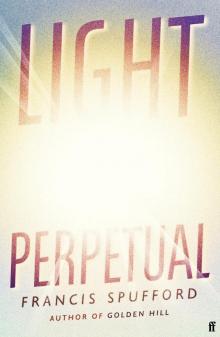 Light Perpetual
Light Perpetual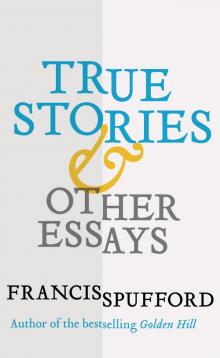 True Stories
True Stories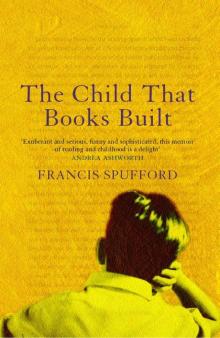 The Child that Books Built
The Child that Books Built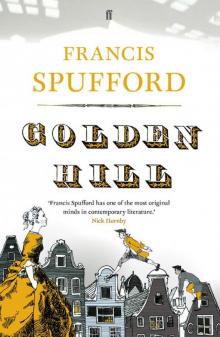 Golden Hill
Golden Hill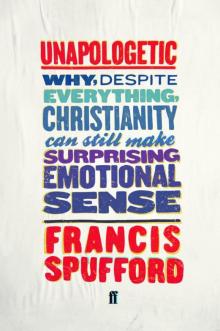 Unapologetic
Unapologetic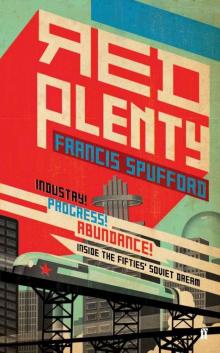 Red Plenty
Red Plenty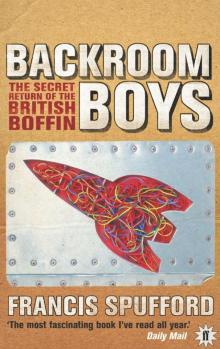 Backroom Boys
Backroom Boys